|
The History of ORIGIN
Over 30 years of experience in Japan and Thailand
1976 ~ 1997 Early Founding in Kyoto
The history of ORIGIN goes back to 1976, when a group of visionaries created the Oomoto School of Traditional Japanese Arts at the Oomoto Foundation outside of Kyoto. The two founders were art collector David Kidd and Mme. Naohi Deguchi the 3rd Spiritual Leader of Oomoto.
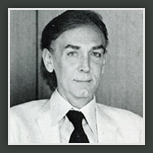 |
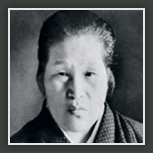 |
| David Kidd |
Mme Naohi Deguchi |
ith the founding of the school, Dean James Parks Morton of the Cathedral of St. John the Divine in New York, and Buckminster Fuller joined the advisory board, as well as other leading cultural figures in Japan. David Kidd brought Alex Kerr (who had grown up in Japan) over from university in England in order to help manage and translate for the first classes.
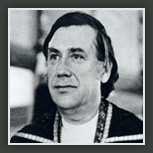 |
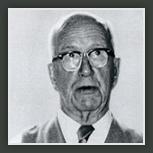 |
| Dean James Parks Morton |
Buckminster Fuller |
This school was the first attempt to teach all the Japanese arts in a unified way in a beautiful context - and over the next 20 years, it produced hundreds of alumni across the world, whose lives were transformed by the experience.
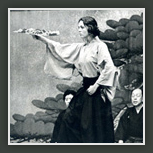 |
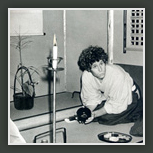 |
| Alexandra Munroe dancing Noh |
Alex Kerr with tea bowl |
During those two decades we developed a unique approach to teaching the arts to modern people. ORIGIN founder Alex Kerr returned to work full time at Oomoto in 1977, acting as manager of the Oomoto School from its inception in 1976 until 1997. Current ORIGIN program manager in Japan, Bodhi Fishman, helped run the Oomoto School from 1992 - 1997.
1997 ~ 2005 Intermediate Years
After the Oomoto School closed in 1997, it was Alex’s dream to revive it in new guise, not only in Japan, its birthplace, but in Thailand as well. Alex had been traveling to Bangkok and Chiangmai regularly since the late 80’s, and realized that visitors to Thailand find the same difficulty in accessing traditional arts as those in Japan.
Early programs in Bangkok, such as one in 1998 for a group of Japanese architects that took place at the Suan Pakkard Palace, made use of the grounds of private homes and institutions, in Bangkok and Chiangmai, that lent the use of their stages and gardens.
Programs in Kyoto included the annual visits of 50 American high-school teachers sponsored by Toyota America, and events for advertising company Ogilvy and Mather. During this time, the program moved amongst many venues, including the headquarters of the Kongo Noh school, and other locations with tea rooms and martial arts halls.
In the early 2000s, the ORIGIN programs developed a more streamlined approach (the old Oomoto school had run for a month every summer; most ORIGIN programs today run for a day or two). At the same time, Alex expanded the reach of the program to a range of masters of traditional arts in both Kyoto and Thailand.
2005 ~ present
It took eight years, but finally in 2005, the ORIGIN Program was born. The name ORIGIN comes from the idea that the program teaches not external forms but the internal spiritual ideas, the “Origin” of the arts. The logo is a flaming jewel, the “Wish-fulfilling Gem,” seen often in East Asian art. It is known as Juyi in Chinese, Nyoi ?? or Hoju ?? in Japanese, Cintamani in Sanskrit and Tibetan, and Jintamani in Thai.
In Bangkok, Alex had rented a complex of old-style Thai houses on stilts in a garden setting in the Ladprao area since 1999. While a number of programs and events had been held here, the house needed work to correct structural defects and install air-conditioning etc. By the end of 2004 the repair was completed, and the complex was ready to host full-scale programs. So also in 2005, the ORIGIN program officially began in Bangkok.
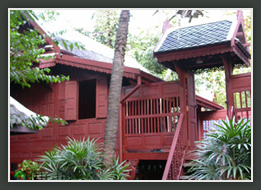 |
| Ladprao |
In Chiangmai, Alex had been running programs for some years with the help of Ajarn Vithi Panichpant at a group of old houses on the grounds of the University of Chiangmai. These programs were formalized as ORIGIN Chiangmai in 2005.
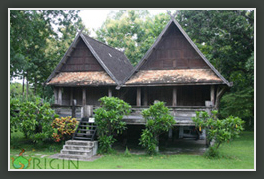 |
| Chiangmai center |
Alex Kerr
Alex Kerr, founder of ORIGIN, and Chairman of Iori, has written extensively about traditional Japanese and Thai arts. For further information see: Alex Kerr website
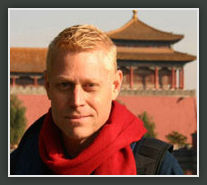 |
| Alex Kerr Bejing |
Origin Foundation (California)
The American School of Japanese Arts (ASJA) was founded in the late 1980s by Liz Kenner and Linda Richardson, graduates from the Oomoto School Seminar. Later Mario Oribe joined Liz Kenner in managing ASJA (a Non-Profit registered in the State of California), and over the next eighteen years it produced hundreds of alumni. In the fall of 2008, AJSA changed its name to Origin Foundation. Origin Foundation
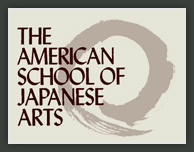 |
| ASJA Brushwork |
Chiiori Trust (Iya Valley, Shikoku)
In 1973 Alex purchased a 300-year old thatched farmhouse in remote Iya Valley in the central mountains of Shikoku. This unique setting has since hosted numerous programs in traditional arts, as well as experience of village life, such as thatching and organic farming. In 2006, Chiiori Trust (a Non-Profit Organization, or “NPO”, registered in Tokushima Prefecture) was founded, and today Chiiori Trust manages the house welcoming visitors and volunteers year-round.
Chiiori Trust
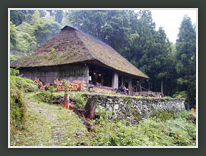 |
| ASJA Brushwork |
Oomoto Foundation
Oomoto is one of the more venerable of Japan’s many new Shinto religions, founded in 1892 by Nao Deguchi together with her charismatic son-in-law Onisaburo Deguchi. From it’s early years, Oomoto placed great importance on the study of the traditional arts as a core element of spiritual practice, espousing the belief that “ Art is the mother of religion.”
|
